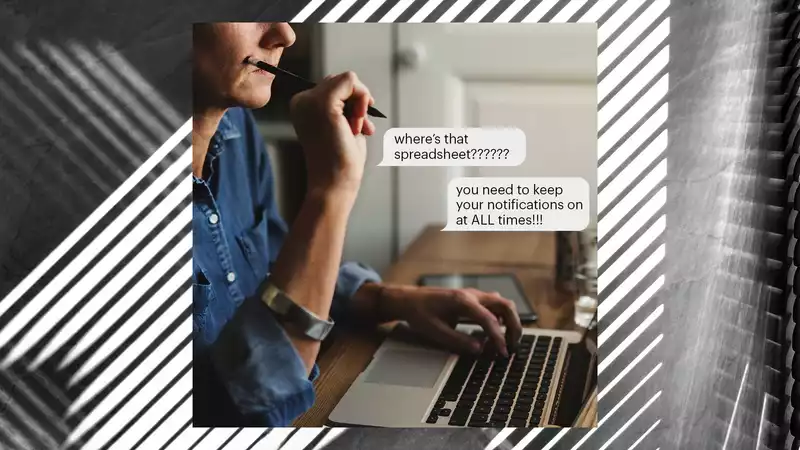
Prince Harry and Meghan Markle at the premiere of "Bob Marley: One Love" in Jamaica.
Prince Harry and Meghan Markle made a surprise red carpet appearance.The Duke and Duchess of Sussex were spotted at the premiere of the music biopic "...
Read More
Catriona*, an employee of a global recruiting firm in Sydney, Australia, was relieved to keep her job in the face of mass layoffs due to the pandemic. 33 years old, she worked her way up the ladder, rising to head of the sales team. Then it all went wrong when telecommuting led to systematic and ongoing bullying from her boss.
"My boss keeps sending me emails telling me what I'm doing and asking me to list all my tasks," she says.
"They never did this to me before I started telecommuting, but now they want me to attend my Zoom meetings and observe my interactions with clients."To make matters worse, she has accused me of being lazy at home. One morning when I logged in at 9:15 AM, she immediately asked why I was logging in late, then sent me a group email demanding that everyone be online before 9:00 AM to start working. Usually in the office we start work at 9:15 a.m., but even then we usually have coffee and get ready for the day."
It has been a year since COVID-19 changed the working world for many professionals. For employees accustomed to an office environment, the shift to remote work seemed like a small sacrifice to keep their jobs during the looming economic downturn. No more long commutes in traffic jams or scrambling to find parking near the office.
For some, however, telecommuting has become a nightmare. Overly critical managers, bosses who take out their anger and frustration on workers, and a constant fear of losing income have turned into another type of pandemic: bullying.
With the WFH situation, employers face a fundamental shift in the means by which they supervise and communicate with their employees, and the misuse of digital tools to influence and control can appear invasive and intimidating to workers if implemented without subtlety or justification. In the absence of physical witnesses, some companies lack clear mechanisms for reporting bullying and harassment. In addition, new hires, temporary employees, and contract workers are particularly vulnerable because they lack the sense of community that office spaces foster.
Anya*, 36, lost her role in HR shortly before the first standoff in Melbourne. When a former colleague suggested she join the consultancy business, it seemed like an ideal situation. She had a Bulgarian passport, so she could not receive government assistance, and she had rent to pay. Then the emails began.
"Come to my office tomorrow," said the 11:30 p.m. message. (At the time, only essential workers were supposed to be in the office.) The manager in charge of Anya's orientation sent an email at 2:00 a.m. one day, saying, "I'm sorry, but we don't need you. You are not needed. "Less than two weeks later, Anya, who had spent hours at home doing the company's online administrative tasks, received a phone call: "You were difficult from the beginning. You've been difficult from the beginning, you don't ask, you don't come to me, and you're not qualified. We don't need you," Anya remembers. The company refused to pay her, claiming that the hours she had performed did not mean she had fulfilled her job. 'I've been in human resources for 10 years now, so I know how good my employer is at handling sexual abuse, bullying, and mismanagement,' she tells Marie Claire. 'Even being an expert doesn't exempt you from bullying, though.'
According to a survey of 229 U.S. human resources departments (open in new tab), about half of the companies had more than 80% of their employees work from home between March and May 2020 because of the COVID-19 pandemic. The survey also predicts that the trend toward remote work will continue to grow over the long term after the pandemic. The increase in telecommuting will likely mean increased demands from employers to install monitoring measures (open in new tab) (facial recognition hardware, cameras, video calls, etc.) to ensure that workers are completing their tasks and adhering to their assigned work hours. At what point does surveillance turn into exploitation and abuse?" When does the zoom become invasive rather than a means of connecting with colleagues?
Jessica Hickman spent five years in management in the UK before moving to Australia in 2013 to work on a large oil and gas project in rural Darwin.
She was in charge of human resources and culture, but as she became more successful, she was further bullied by the HR manager. She said, "I got so burned out that I ended up in the hospital, and as soon as I recovered [in 2017], I started Bullyology." Bullyology (open in new tab) now offers training programs and workshops worldwide to address toxic workplace cultures.
Hickman notes that since March 2020, bullying reports have increased by 70% (open in new tab). She cites the pressures associated with the current lack of job security, the need to work systematically while worrying about childcare, the lack of a clear lunch break, and "zoom fatigue" as reasons why people are more likely to bully others or be bullied themselves.
"Roles are vague and there is no clear process for remote work. People are vulnerable and bullies operate with power and control," Hickman said.
Serena*, 42, works in communications for a Melbourne-based global healthcare organization. Since being required to work from home last March, she has found the balance between work and personal life blurred, making it almost impossible to feel relaxed.
"I am expected to be on call at all hours. It is exhausting. My manager asks each of my team (members) questions about the other members of our team. She asks if we are talking to each other and what we are saying. Her behavior really shows a lack of trust and makes me question whether I can trust my co-workers."
Selina said she was humiliated by her supervisor during a group Zoom call. This is even more stressful given that her workload has doubled during the pandemic. She says, "Last month I needed to see a doctor, and my supervisor's response was that it would be an hour before I could see a doctor and get back online. Further, when I told her I needed help reducing my workload, she said I should "suck it up" and stop complaining.
COVID-19 increases the risk of burnout and chronic stress (open in new tab) syndrome, giving a constant feeling of fatigue and indifference to work. Coupled with nonstop media exposure to stories of death, destruction, and doom, the stage seems to be set for people under stress to behave in ways that would be unthinkable in a traditional work environment. [For the past 17 years, says Robin A. Barkley, professor of business administration at Southern Illinois University, who has studied perceptions of harassment in the digital environment. Because they are physically and emotionally excluded, harassers can close their email, shut down Zoom, and feel detached as if they don't have to deal with the consequences while the threat of victimization is not in front of them, so they engage in abuse."
Hickman left the workplace in 2016. She says she still breaks out in a rash when she talks about bullying and the loneliness and exhaustion she felt, especially when away from family and friends. 'I spent three years in fight-or-flight mode, which affected my eating, sleeping, and weight. It's hard to work in any organization if you're physically, mentally, and emotionally damaged. I was lucky enough to seek therapy and support, but it took me a while to get my business up and running and ready to get back to work." *Surname has been removed to protect the privacy of the source.
.
Prince Harry and Meghan Markle made a surprise red carpet appearance.The Duke and Duchess of Sussex were spotted at the premiere of the music biopic "...
Read More
Taylor Swift is once again proving just how generous she is.At Sunday's Chiefs game at Highmark Stadium in Orchard Park, NY, the superstar made a grea...
Read More
Ken is not having a good day.Ryan Gosling is clearly pleased to have been nominated for Best Supporting Actor at the 2024 Academy Awards, but his achi...
Read More
Some A-listers like the wide open back of a black dress, but in Kendall Jenner's case, she likes the wide open front of a black dress (well, back, too...
Read More
Comments